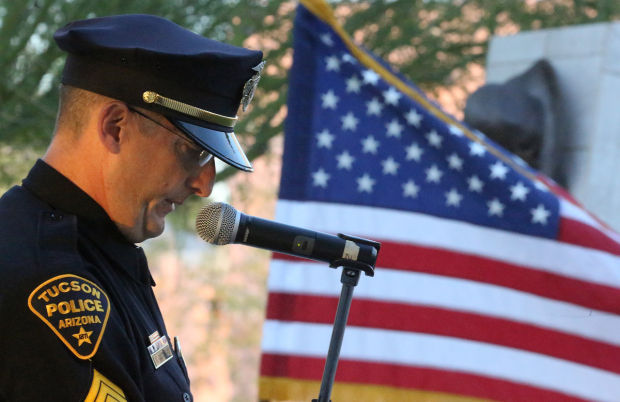After being shot in the head at a residential burglary call in November, Tucson police Sgt. Robert Carpenter thought he was going to die.
A few seconds after he fell to the ground he took his hand from his head, saw the blood covering it and began to pray, recalled Carpenter, the keynote speaker Wednesday at the Tucson Police Department's tribute to officers who have died in the line of duty.
"I prayed for my family, that they would be taken care of and, being selfish, a short word for myself, asking for forgiveness, because I was convinced that I was not going to survive.
"As the minutes passed I felt my awareness diminishing, so I focused on God and my family," said Carpenter, 47, who hopes to return to administrative duty in June if his doctors allow it.
The bullet remains lodged in his brain and Carpenter completed physical therapy and rehabilitation. He is still undergoing vision therapy.
Several hundred law-enforcement officers, family and friends attended the service paying honor to eight TPD officers who died, each represented by a star. The service was on the lawn in front of police headquarters at 270 S. Stone Ave.
"It is only by the grace of God, the bravery of my fellow officers and the skill of the medical staff at University Medical Center, that there are not nine stars," said Carpenter.
As he prepared for the service, Carpenter said, he "came to the realization that while we commemorate the officers that were lost, I think that we also need to recognize and keep in mind the families that they left behind."
"Recently, I had the opportunity to read the email updates that my wife (Cindy) sent out to friends and family after I was shot. Among the medical updates and the hope that she expressed, I could get a sense of the pain, anguish and anger that she was feeling.
"I also got a sense of the strength of character it takes to be the spouse of a law-enforcement officer," said Carpenter. He shared Cindy's memory of getting the knock on the door and being told by an officer and sergeant that she had to get dressed and go with them to the hospital because her husband was injured.
It was his wife who encouraged Carpenter during his treatment while he was hooked up to IVs and monitors and while he had about 20 percent of his skull removed due to brain swelling.
Cindy endured seeing her husband in "constant severe pain for three months until the reconstructive surgery was performed," Carpenter recalled.
A few weeks ago he explained to a puzzled doctor why he planned on returning to the Police Department.
"I must, because my extended family of officers needs me as much as I need them. I must, because it is what I do, it is what I am.
"I can return to full duty confident that no matter what happens, there is never any need to be afraid, because you are never alone, and even if the worst should happen, your families will be looked after," explained Carpenter, adding that fellow officers would see to it.
Carpenter received a standing ovation at the service, which included prayers, the posting of colors, a red rose presented at the memorial for each officer who was killed, a 21-gun salute and a fly over by the department's helicopter unit.
Police Chief Roberto Villaseñor said since last year's memorial, the Tucson community endured Carpenter's close call, and the nation endured "the Aurora, Colo. theater shootings, the Newtown, Conn. school shooting, the Christopher Dorner/Los Angeles Police Department manhunt and, most recently, the Boston Marathon bombing and subsequent chase and firefight with the bombing suspects."
"Each of these situations illustrated the need for individuals to have the courage and training necessary to enter into situations that normally would cause people to run away.
"I am proud to say that in each incident, police officers in every part of the country willingly stepped into the fray and exposed themselves to life-threatening scenarios to restore peace and bring about justice," Villaseñor said.
During the ceremony the fallen officers honored were:
• Erik D. Hite, who died June 2, 2008, after being shot in the head during a 20-mile chase and shootout through the city.
• Patrick K. Hardesty, who died May 26, 2003, shot to death while chasing a hit-and-run suspect.
• Jeffrey Ross, who died Feb. 18, 1982, after he was shot in the chest at the Ranch House Bar on North Casa Grande Highway. Ross was working a drug arrest operation.
• James Smith, who died Oct. 28, 1980, while on motorcycle patrol in the reversible middle lane of East Speedway near North Plumer Avenue. He was grazed by a station wagon and thrown into oncoming traffic.
• Barry Headricks, who died Oct. 28, 1974, of gunshot wounds suffered during a heroin bust on East Eighth Street.
• Robert Cummins, who died Sept. 7, 1936, four days after his patrol motorcycle skidded on loose gravel at the end of an American Legion convention parade in Phoenix.
• William Katzenstein, who died July 26, 1902, after he was shot by a man who was stalking him.
• William Elliott, who died July 3, 1892, after he was stabbed in the heart by a man in front of the mayor's house.
Contact reporter Carmen Duarte at cduarte@azstarnet.com or 573-4104.





